In the fast-paced digital era, where screens dominate our daily lives, maintaining good eye health has become more crucial than ever. Our eyes are not only windows to the world but also intricate organs that require proper care and attention. Here’s a comprehensive guide on how to keep your eyes healthy and ensure optimal vision.

1. Balanced Diet for Bright Eyes
A well-balanced diet plays a pivotal role in maintaining eye health. Foods rich in vitamins A, C, and E, as well as minerals like zinc and omega-3 fatty acids, contribute significantly to the well-being of your eyes. Include leafy greens, colorful fruits, nuts, and fish in your diet to provide essential nutrients that support eye function.
2. Hydration Habits
Staying hydrated is essential for overall health, including eye health. Dehydration can lead to dry eyes and discomfort. Aim to drink at least eight glasses of water a day to keep your eyes adequately moisturized. Limit the consumption of caffeinated and alcoholic beverages, as they can contribute to dehydration.
3. Protective Eyewear
Whether you’re working on a computer, playing sports, or spending time outdoors, wearing appropriate eyewear is crucial. Blue light from digital screens can strain your eyes, leading to digital eye fatigue. Consider using blue light-blocking glasses to reduce eye strain. Additionally, protective sunglasses with UV protection shield your eyes from harmful ultraviolet rays.
4. Follow the 20-20-20 Rule
To prevent eye strain, especially during prolonged screen time, adhere to the 20-20-20 rule. Every 20 minutes, take a 20-second break, and look at something 20 feet away. This simple practice helps reduce eye fatigue and keeps your eyes more relaxed.
5. Proper Lighting Conditions
Ensure that your workspace and living areas are well-lit to reduce eye strain. Avoid excessive glare by positioning your computer or other screens away from direct light sources. Use curtains or blinds to control natural light and prevent glare that could potentially harm your eyes.
6. Regular Eye Check-ups
Routine eye check-ups are essential, even if you don’t currently wear glasses. Eye exams can detect potential issues early on, allowing for timely intervention. Professionals recommend getting your eyes checked every two years, or more frequently if you have pre-existing eye conditions.
7. Eye Exercises for Flexibility
Just as physical exercise is crucial for maintaining overall health, eye exercises can help enhance eye flexibility and reduce strain. Simple exercises like focusing on a distant object, rolling your eyes in circular motions, or palming (covering your closed eyes with your palms) can contribute to improved eye health.
8. Adequate Sleep
Quality sleep is vital for overall well-being, and your eyes are no exception. Lack of sleep can lead to eye fatigue, dryness, and even blurred vision. Aim for 7-9 hours of sleep each night to allow your eyes to rest and rejuvenate.
9. Quit Smoking
Smoking has detrimental effects on eye health and is a significant risk factor for developing age-related macular degeneration and cataracts. Quitting smoking not only benefits your overall health but also contributes to maintaining healthy eyes.
10. Stay Informed and Educated
Stay informed about your family’s eye health history. Certain eye conditions, such as glaucoma or macular degeneration, may have a genetic component. Understanding your family’s eye health history allows you to take proactive measures and seek early detection and treatment if needed.
In conclusion, maintaining healthy eyes involves a combination of lifestyle choices, protective measures, and regular check-ups. By adopting these habits, you can contribute to preserving your vision and enjoying a life with vibrant and clear eyesight. Remember, your eyes are precious, and investing time and effort in their care is a small price to pay for a lifetime of good vision.